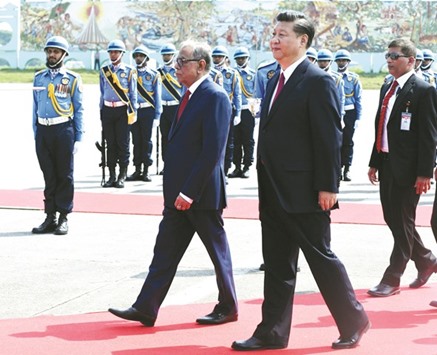Chinese President Xi Jinping signed loans and investment deals with Bangladesh worth about $20bn yesterday, seeking to increase Beijing’s influence in a country closely allied to rival regional power India.
Xi hailed what he called a “historical turning point” in relations with the impoverished South Asian nation after talks with Prime Minister Sheikh Hasina.
A senior minister who attended the closed-door talks said the loan agreements from Beijing, which will fund key infrastructure projects such as roads and railways as well as a new industrial park, totalled around $20bn.
“Bangladesh and China have also identified other projects, whose total loans and investment will surpass $50bn,” he said on condition of anonymity.
Xi said both sides had agreed to look into a free trade agreement and expressed hopes the visit would “chart the course for the future growth of China-Bangladesh relations”.
It is the first visit in more than three decades by a Chinese president to Bangladesh, which lies firmly within New Delhi’s sphere of influence.
Bangladesh needs tens of billions of dollars of investment in its transport infrastructure and energy production to boost its flagging economic fortunes and create jobs for its 160mn people.
But analysts said Hasina would have to maintain a careful balancing act between cultivating economic ties with China, already the country’s largest trading partner, and maintaining good relations with India.
New Delhi has long backed Hasina and held off from criticising her re-election in January 2014 in a contest that was boycotted by the opposition and dismissed as “not credible” by Western nations.
“Bangladesh is in India’s sphere of influence,” said Ali Riaz, political science professor at Illinois State University in the United States.
“Understandably, India is watching Bangladesh’s growing ties with Beijing. But Bangladesh is improving ties with China carefully so that it does not jeopardise its relations with India,” he said.
Xi will travel on to the western Indian state of Goa today for a summit of Brics countries – Brazil, Russia, India, China and South Africa – and a one-on-one meeting with Indian Prime
Minister Narendra Modi.
China and India, the world’s two most populous nations, are jockeying for regional influence in Asia.
Their relationship is coloured by a brief but bloody 1962 border war over the northeastern Indian state of Arunachal Pradesh, parts of which Beijing claims as
south Tibet.
China has committed to a major programme of infrastructure building stretching from its immediate neighbourhood to Europe through its flagship “One Belt, One Road” policy which seeks to revive the ancient Silk Road trade route.
Asked whether that investment could jeopardise her country’s ties with India, Hasina said Bangladesh would maintain “good relations with everyone”.
“The purchasing power of our people will increase, and who will be the bigger beneficiary of that in our region? India. India is best poised to benefit from the Bangladeshi market,” she said in an interview with Indian daily The Hindu.
Bangladesh has also agreed to set up an industrial park exclusively for Chinese investors near the strategic port of Chittagong that it hopes will attract manufacturers seeking cheaper labour than they can find at home.
“Labour costs in China are six-seven times higher than Bangladesh. The special economic zone alone can bring in $5-$7bn in Chinese investment,” said Abdul Matlub Ahmad, head of the Federation of Bangladesh Chambers of Commerce and Industry.
That could create much-needed employment – Bangladesh’s economy has been growing at more than 6% in the last decade, but the World Bank says it needs at least 8% growth to
create enough jobs.
Bangladesh’s $28bn garment manufacturing industry is the world’s second largest after China’s, accounts for 80% of the country’s annual shipments and employs some 40% of its
industrial workforce.

Chinese President Xi Jinping, right, walks with Bangladesh’s President Abdul Hamid after arriving in Dhaka yesterday.
